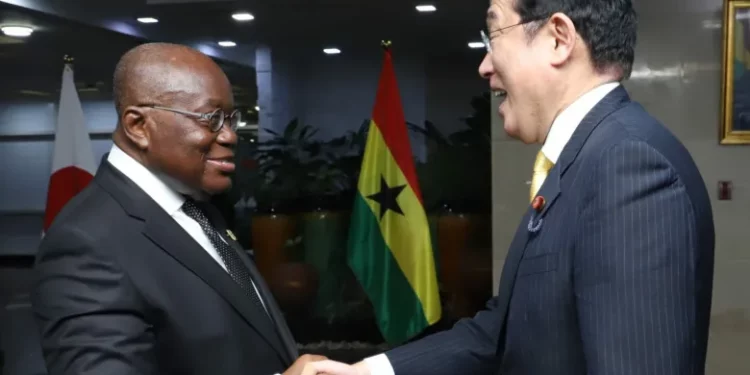Ghana and Japan strengthen economic ties with new agreements
Speaking to the press following the bilateral talks, President Nana Addo Dankwa Akufo-Addo highlighted the importance of collaboration between Ghana and Japan in addressing a range of global challenges, including poverty, migration, terrorism, and climate change. The president emphasized that Ghana will continue to work closely with Japan to promote peace and security, both within the region and around the world.
Ghana and Japan have signed two memorandums of understanding (MoUs) focused on enhancing rice seed production capacity and human resource development scholarship. These agreements represent an important step forward in the economic partnership between the two countries, as they seek to leverage their respective strengths to create mutually beneficial outcomes.
Speaking to the press following the bilateral talks, President Nana Addo Dankwa Akufo-Addo highlighted the importance of collaboration between Ghana and Japan in addressing a range of global challenges, including poverty, migration, terrorism, and climate change. The president emphasized that Ghana will continue to work closely with Japan to promote peace and security, both within the region and around the world.
For his part, Prime Minister Kishida praised Ghana as a strategic partner for Japan in West Africa. He pledged to continue supporting Ghana’s infrastructure development, including the ongoing project to improve the Tema Motorway Roundabout. Kishida also announced a $500 million grant to support efforts aimed at securing peace and stability in the Gulf of Guinea region.
The visit by the Japanese delegation was just one of many initiatives that Ghana has undertaken in recent years to promote economic growth and development. The country has launched a range of policies and programs aimed at attracting foreign investment, boosting exports, and creating jobs.
One key initiative is the Ghana Beyond Aid agenda, which seeks to promote self-reliance and reduce the country’s reliance on foreign aid. The agenda includes a range of measures aimed at improving governance, boosting productivity, and diversifying the economy.
Another important initiative is the One District, One Factory (1D1F) program, which seeks to promote industrialization and create jobs in rural areas. Under this program, the government is providing support to entrepreneurs and investors to establish factories in every district of the country.
In addition, Ghana has taken steps to improve its business environment and attract foreign investment. The country has implemented a range of reforms aimed at reducing bureaucratic red tape, streamlining business registration, and improving access to finance. As a result, Ghana has climbed the ranks of the World Bank’s Doing Business report, which measures the ease of doing business in different countries.
Despite these efforts, Ghana still faces significant challenges in achieving sustained economic growth and development. The country continues to grapple with issues such as corruption, high levels of debt, and a weak private sector. In addition, the ongoing Covid-19 pandemic has had a significant impact on the economy, particularly in sectors such as tourism and hospitality.
Nevertheless, Ghana’s commitment to pursuing economic growth and development is commendable. By leveraging its strengths and partnering with other countries such as Japan, Ghana has the potential to become a major economic powerhouse in West Africa and beyond. With continued investment in infrastructure, human capital, and innovation, Ghana can build a vibrant and prosperous economy.
Source: norvanreports.com


